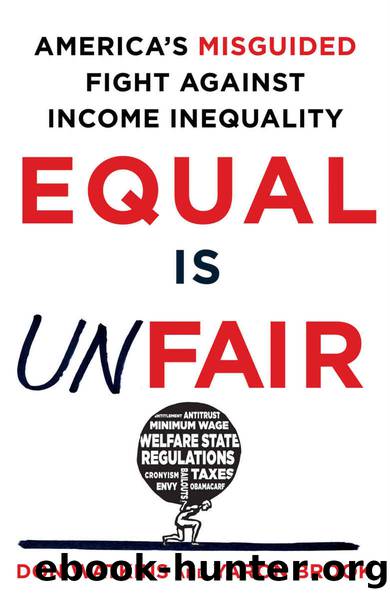Equal Is Unfair: America's Misguided Fight Against Income Inequality by Don Watkins & Yaron Brook

Author:Don Watkins & Yaron Brook [Watkins, Don]
Language: eng
Format: epub
Publisher: St. Martin's Press
Published: 2016-03-29T07:00:00+00:00
Chapter Six
The Money-Makers and the Money-Appropriators
The Deserving Rich?
The American Dream is more than an aspirational story about striving and success. It is, in the best sense, a morality tale: it says that if you do the right things—if you think, learn, strive, work hard, act responsibly—you can achieve great things. In America, what matters is not privilege but merit. Success is to be admired because, setting aside the occasional fraud and huckster, it is earned.
This is what most of us have in mind when we talk about fairness in society. It’s the idea that our choices will shape our destinies, for better or for worse. The inequality critics argue that this, if it was ever true of America, no longer is. They argue that “the rich” are getting richer, not through merit, but through rigging the game in their favor, and that, as a result, the rest of us are working harder and harder and getting nowhere.
The truth is that some people today are getting rich through political privilege, although that is by no means true of most successful Americans. If we value fairness, we need to learn to distinguish between earned fortunes and unearned fortunes—and then we need to put an end to people’s ability to capture the unearned.
What does it mean to say that someone “earned” his income? In short, that he produced it. If Robinson Crusoe builds a spear and uses it to catch a fish, he earned that fish—he produced it, it belongs to him, and it would be wrong for Friday to come along and take it. By the same token, we can earn values indirectly, by trading what we produce for the things that others produce. If Crusoe chooses not to eat his fish, but exchanges it with Friday for a coconut Friday chopped down from a tree, then Crusoe earned that coconut by obtaining it through the voluntary consent of Friday in a value-for-value trade.
In a division of labor economy, the principle is the same, but its application is less obvious. We don’t produce and trade concrete items like fish and coconuts, as people do in barter economies. Instead, we produce in exchange for money, and we exchange the money for the things that others produce. How much money we receive for our productive efforts, and what we are able to buy with that money, is determined by the voluntary consent of the people we exchange with. To earn something, in a division of labor context, is to acquire it through production and voluntary exchange. What we merit is the economic value we create, as judged by the people who voluntarily transact with us.
It’s a mistake to view economic rewards as payment for merit as such. We do not get paid in proportion to the laudable qualities we display—virtues such as diligence, integrity, and effort. Bill Gates worked hard to build Microsoft, but he’s not a billionaire because he worked 20,000 times harder than the average American. To be sure, when a person is enormously successful, this almost always indicates virtue on his part.
Download
This site does not store any files on its server. We only index and link to content provided by other sites. Please contact the content providers to delete copyright contents if any and email us, we'll remove relevant links or contents immediately.
| Anthropology | Archaeology |
| Philosophy | Politics & Government |
| Social Sciences | Sociology |
| Women's Studies |
Nudge - Improving Decisions about Health, Wealth, and Happiness by Thaler Sunstein(7706)
The Fire Next Time by James Baldwin(5444)
iGen by Jean M. Twenge(5415)
Adulting by Kelly Williams Brown(4574)
The Sports Rules Book by Human Kinetics(4386)
The Hacking of the American Mind by Robert H. Lustig(4383)
The Ethical Slut by Janet W. Hardy(4251)
Captivate by Vanessa Van Edwards(3839)
Mummy Knew by Lisa James(3691)
In a Sunburned Country by Bill Bryson(3542)
The Worm at the Core by Sheldon Solomon(3487)
Ants Among Elephants by Sujatha Gidla(3467)
The 48 laws of power by Robert Greene & Joost Elffers(3291)
Suicide: A Study in Sociology by Emile Durkheim(3022)
The Slow Fix: Solve Problems, Work Smarter, and Live Better In a World Addicted to Speed by Carl Honore(3009)
The Tipping Point by Malcolm Gladwell(2922)
Humans of New York by Brandon Stanton(2873)
Get What's Yours for Medicare: Maximize Your Coverage, Minimize Your Costs by Philip Moeller(2730)
Handbook of Forensic Sociology and Psychology by Stephen J. Morewitz & Mark L. Goldstein(2705)
